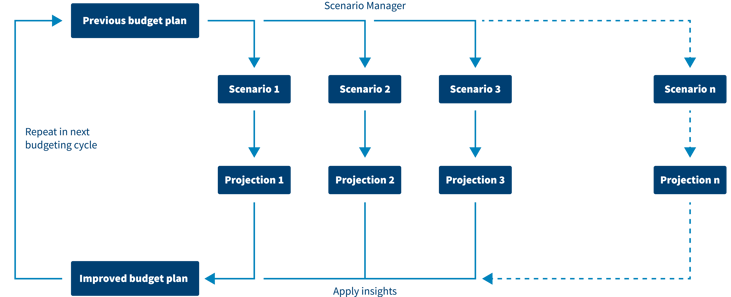ITFM tools offer a variety of functions to optimize your planning, budgeting, and reporting processes. In the past we have talked about things like the IT service catalog or the cost-to-service flow. Today, we will have a look at financial planning based on powerful planning scenarios.
Imagine the following: it is almost time to finalize the budget for the next cycle but you are unsure as to whether you have made the right adjustments. Last cycle went fine, but you just know that there is ample room for improvement. You have some ideas, but there is no way to guarantee that any of them might be the right fit for your current situations.
Some thoughts and questions you might have:
- What costs would acquiring asset XYZ cause? What value could be created through that acquisition?
- How would reducing the budget spend on any IT service affect the value chain?
- What if we use benchmark prices instead of unit costs for storage services? What would be the impact on service prices?
- How would a move to the cloud benefit our profitability?
It is questions like these, that a functionality for scenario-based planning enables you to prepare for. The way it works is that you take an existing budget plan and create derivative scenarios based on that, in which you make the changes that you want to plan for. Ideally, you can get numerous - virtually infinite - projections on what specific changes to your budget would mean for your business. You will have more flexibility, insight, and foresight when it comes to value generation and future budgeting decisions and adjustments.

A scenario manager allows you to create virtually infinite planning scenarios
To better illustrate the capabilities of scenario-based planning we will give you a tiny but more concrete example: Imagine we would want to transfer 50% of our storage space into the cloud. First we refer to our plan scenario that is running the current numbers with regard to cost and budget allocations. Based on this plan scenario we create a derivative scenario in which we adjust the metrics to reflect the changes that would come with transferring our storage space into our cloud. The derivative scenario will then give us a prediction for what would change if we actually were to follow that plan, i.e. show us what it could mean for IT costs in regard to our customers and such.
It is in your best interest to utilize scenario-based planning to flexibly react during the budgeting process. Serviceware Financial offers a powerful Scenario Manager alongside other functionalities, that allows CIOs and CFOs to revolutionize their ITFM. Have a look at Forrester's Study on the Total Economic Impact of Serviceware Financial to find out more.

 German
German

